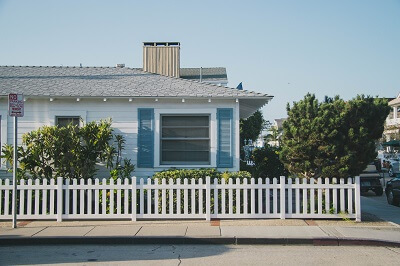The question of rudeness does not arise in the act of putting up a fence. It is the way you do it that may make your decision a rude one.
Setting up a privacy fence is a justifiable action, and if you are within regulations, it is your right. However, there is potential for disputes with your neighbors, and it will be rude not to practice good etiquette in your action.

You do not need your neighbors’ permission to put up a privacy fence if it is within your property. Just make sure you avoid any friction by ignoring simple courtesy or going against set laws and restrictions.
Why you may want to put up a private fence
Putting up a privacy fence is a considered decision you take for one or several reasons. The following five are the best reasons to justify the decisions.
If you are in a neighborhood which does not have fences, outing up one may be hard to justify away from these reasons.
Marking property
If you have a large piece of land for your property or are worried about encroachment, then marking your property is an excellent idea. Being proactive in protecting your property will save you finances on lawsuits trying to defend it or get it back.
You may also need to get the property marketed if you plan for renovations or make additions to the property. In this case, it will help to know the amount of space you have left.
You need added privacy
As the fence’s name suggests, this is a structure you put up when you feel you need to keep off prying eyes and curious onlookers.
For example, if you plan to be sunbathing nude on the patio or on the pool, you do not want neighbors and their children looking. At times you want a mobility barrier to protect against trespassing and unauthorized use of your property space.
Depending on your needs, you may opt for a solid fence like vinyl or a chain-link fence.
Safety
Another significant reason to have private property is safety. It includes safety for your property, your kids, and even pets. Not all neighbors may be friendly to your pets moving around in their yards and probably defecating it.
You may also want to protect the pets from getting lost or your young children from potential risks like unguarded pools. Besides, it is always nice to know where your kids and pets are and keep unwanted pests and children in your yard.
Seclusion
At times your personality or maybe disputes with the neighbors make you seek seclusion. It is a hard choice and is likely to come off as rude if it is an area where people have open yards and lawns.
However, if you are out to keep your affairs to yourself or do not want to deal with neighbors’ squabbles, it is proper to put up your fence. It is, after all, your property and well within your rights.
Regulatory requirements to consider when setting up a privacy fence
While most of the time, you do not need anyone’s approval to get your private fence up, the following three requirements are important.
Observe plot boundaries
Getting your property lines wrong will not only get you in a dispute with your neighbor but also see your structure pulled down. Even if you go over the property lines by one inch, it is still encroachment, and it is both rude and illegal.
The best approach to this is to get the recent property plat and, where possible, get a surveyor to clarify the boundaries. A survey may cost a few hundred bucks, but it will save you disputes and potential losses. Even then, it is still better to keep the fence at least a foot inside your property line, so you fully own and manage it.
Respect zoning regulations
There are several zoning regulations providing guidelines on fences in different areas. These regulations govern mostly things like setbacks, height, and other aspects.
In most cases, the height limit for the side fences and backyards is six feet and four feet for the front yard.
Spots in corners and blind curves have more restrictions since they may affect the visibility of road users. Therefore, it is a good idea to know the limits of fences in your area before setting one up.
Observe HOA rules
Outside the zonal regulations, the Home Owners Association (HOA) rules govern each neighborhood. Before setting up a privacy fence, you will need to know your association’s guidelines on fences.
They can be more restrictive than the zonal since they govern the height, style, and even maintenance of the fence. They may even have a requirement for all fences to match, leaving you with little room for tailoring it to your preferences.
If you do not follow these rules, you will have the whole neighborhood up in arms, and you may have unending disputes.
Instances when it may be rude to put up a privacy fence
As the first section captures, the rudeness is largely in the manner the privacy fence is set up. Here are some instances you may want to avoid where possible.
If you have had a good relationship all along
You may have had a good relationship with your neighbor, and you both are used to the regular greetings and even walking across the yards to each other’s house.
Thus, if you wake up one day and start installing a privacy fence, your neighbors may feel offended and find it rude.
When you violate local laws
If you violate local laws, you cannot plead ignorance as a defense. If you violate the rules, then your neighbors will see you as going overboard. More importantly, you will have issues with the authorities.
You will also have a problem with the HOA, which you most likely will be flouting as well. It is not only rude; it is illegal and will cost you.
When you block a view of traffic or landscape
Should your home be located at a strategic point, either offering excellent views of a landscape or the road, erecting a fence may be rude. This is because, depending on the height and style of the fence you have, you could be blocking your neighbor.
While blocking the view of the road and traffic will probably be in the zonal regulations, blocking the landscape will not. Your neighbor may be forced to file complaints, so you may have to consider alternatives that are not contentious.
If you are putting up live fences with no maintenance
When you install a privacy hedge, the neighbors want to know if you have a maintenance plan. A live fence is even more contentious because if it gets too tall, or if they are untrimmed.
Other neighbors may also fear things like snakes. You will also need to have a fence style in line with the HOA regulations.
If there is yard encroachment
Yard encroachment is one of the top examples where your neighbor will think your actions are rude. Even if you are on the right, if your neighbor thinks you have encroached on part of his property, it will result in a dispute.
Therefore, it helps to get a surveyor who clarifies the boundaries, and it is not just your word against your neighbor’s.
Proper privacy fence etiquette tips
Fence etiquette can help you get over most of these tricky situations. At best, even if you disagree, you will not be seen as rude since you have practice courtesy and good etiquette. When you want to erect a privacy fence, do the following:
Observe property lines
Do not install your fence without getting official confirmation of where your boundary lines lie. Get an official plat and hire a surveyor to ensure you have no boundary conflict with your neighbor and prevent future issues down the line.
Talk to your neighbor
This step should be the first action. You do not have to tell your neighbor, but it helps to let them know your plans so you can sort out any potential issues. It is polite and helps them prepare, for example, by holding their pets up for the duration of the installation.
You may need to use their property during the process, so an early heads-up smoothens most things up.
Let the finished side face your neighbor
As a rule, if you are using traditional fences, the finished part gets to face the neighbor. It is the front face, the one without rails and bars, which makes it the better-looking side. You should not leave your neighbor with an ugly side or an eyesore if you want to be polite.
Maintain your fence
Regardless of your fence type, keep it in good condition, and always let your neighbors know if you are planning maintenance. Good fences keep everyone’s home neat, and it is your responsibility since you own the fence.
Discuss any changes that may affect them
If any changes affect your neighbors from your fence, it is good to let them know beforehand.
For example, you may need to remove a tree to make way for your fence, and it will be rude to go ahead and not discuss it with your neighbor first.

Sophie Hammond is a journalist, psychologist, and freelance speechwriter for people in politics and business. She lives on the edge of the Rocky Mountains with her dog and a lifetime supply of books. When she’s not writing, she can be found wandering through nature or journaling at a coffee shop.

